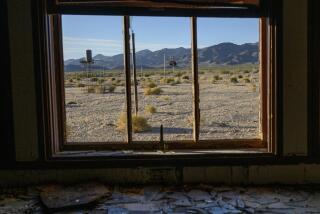Earth’s Forecast: More Heat
- Share via
UC Irvine Chancellor Ralph J. Cicerone, a renowned atmospheric scientist, told a gathering of researchers Monday that no matter what humans do, the Earth’s average temperature will continue to rise for at least 50 years because of past actions of industrial nations, including the United States.
The atmosphere will be further “bombarded” by greenhouse gases produced by developing nations such as India and China, making it imperative for developed nations to move now to reduce emissions from gas, oil and coal-burning technologies, Cicerone said at a conference of the American Assn. for the Advancement of Science’s Pacific Division at the Irvine campus.
“Starting around 1980, we’ve had a dramatic warming,” said Cicerone, who headed a National Academy of Sciences committee charged by President Bush to report the scientific facts about climate change, its causes and potential effects.
That report was released June 6, just before Bush met with European allies who have concerns about his repudiation of the Kyoto Treaty, a 1997 international pact aimed at reducing greenhouse-gas emissions.
“It’s real. Everyone believes it’s real,” the chancellor said as he showed slides depicting average global temperatures over the last 120 years.
The American Assn. for the Advancement of Science is the world’s largest general science organization and the publisher of the peer-reviewed journal Science.
Cicerone declined to comment on the administration’s stance on the Kyoto Treaty, but he said continued global warming “depends a lot on what we do right now.”
Greenhouse gases--primarily carbon dioxide and methane--are believed to be responsible for global warming because they trap heat from the sun, which causes land and ocean temperatures to rise. The United States generates 23% of all greenhouse emissions, according to the White House.
Cicerone’s previous work helped lead to the 1987 Montreal Protocol, a treaty signed by more than 160 nations that is phasing out ozone-destroying chemicals, including Freon and chlorofluorocarbons, from aerosol products.
The dramatic rise in temperatures corresponds with a rapid jump in greenhouse gas levels, he said. He painted a troubling picture of the future:
* Climate change over the next 50 years is inevitable because of “unrealized” heat, or emissions that now are being stored in the world’s oceans.
* To merely maintain the current level of carbon dioxide in the atmosphere, emissions would have to be cut by more than 50%.
The National Academy of Sciences report said the planet’s average temperature will rise 2.5 degrees to 10.4 degrees by 2100, and potential long-term effects include increased drought in semiarid regions and higher sea levels.
However, the 11 scientists on the committee that advised Bush could not determine what levels of greenhouse gases are safe, which prompted the president to say that more climate research is necessary.
Developing nations are not subject to binding targets in the Kyoto Treaty, one of the reasons Bush has argued that the 1997 pact is “fatally flawed.”
Cicerone said the administration was in “some disarray in addressing the situation,” but officials are now taking the matter quite seriously.
He said he has been told that at least three Cabinet members--Commerce Secretary Don Evans, Treasury Secretary Paul H. O’Neill and U.S. Environmental Protection Agency Administrator Christie Whitman--believe the administration must take a stronger stance against global warming.







